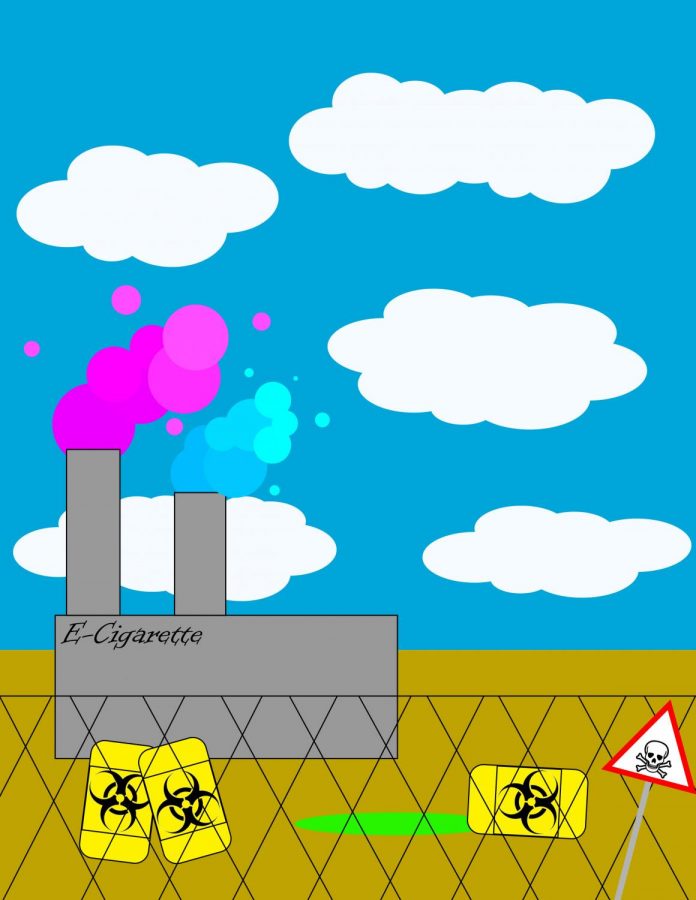Flavored deception
The vaping industry is deceiving teens using misinformation and strategic marketing
As traditional smoking has gone down, 27% of high schoolers now use some type of E-cigarette, according to the Center for Disease Control and Prevention and is a new problem by itself. Although Juul and other E-cigarettes claim that their devices are used to get people away from smoking cigarettes, but in reality, millions of teens get addicted to nicotine because of them.
Juul is following the same patterns as big tobacco corporations, by deceiving and tricking the American public and youth to use their product. In the 1940s Camel cigarettes launched an ad campaign where their slogan was “More doctors smoke Camels than any other cigarette.” Lucky Strike, another cigarette company, also claimed that their product was newer and safer, saying that they didn’t make their cigarettes “the old fashioned way”. Cigarette companies have always marketed their products as safer than what has come before, and E-cigarettes are no different. Similarly, Juul has advertised its product as a 99% safer alternative to cigarettes. Juul is also 35% owned by a company called Altria, which owns several tobacco brands like Marlboro. Just like how the advertising in the 1940’s caused a generational health problem, the same could happen with Juul and the youth of today.
The business strategy for Juul and other E-cigarettes is simple, get teens addicted to nicotine so that they have to buy their products. One Juul pod has about the same amount of nicotine as 20 cigarettes. These introduced flavors and extremely high amounts of nicotine make it easier to get consumers addicted to their products. Getting hooked on E-cigarettes, nicotine, and other addictive substances are much easier for teens. When you are a teenager, your brain is not fully developed, getting addicted happens quicker, and makes it harder to quit later on. Those who get addicted to nicotine from a young age will be more susceptible to addiction to other substances later on. Research from the United Kingdom’s Royal College of Statistics has shown that nicotine is as addictive as cocaine and more addictive than alcohol.
The way that Juul uses the nicotine in a form called “nicotine salts”, which makes the negative impacts of this chemical are magnified. The structure of nicotine salts both makes it easier to be consumed in larger quantities and lets the nicotine to be absorbed directly into the bloodstream. Another chemical in Juuls called benzoic acid has many side effects such as coughs, sore throat, nausea, and abdominal pain, according to the Center for Disease Control and Prevention. Juul is intentional with what it puts in its product. They purposefully engineered the nicotine salts to hook and addict people in a faster way. The manufacturers also did not care if the other chemicals in Juuls are bad for the consumers using them, as long as they get money.
Like many things, the actual usage of E-cigarettes is neither the intended usage by the provider nor the advertised usage of the product. Juul claims that it could be used to help get people off smoking cigarettes, although in reality, far more teens started getting addicted to nicotine than adults got off of smoking cigarettes. The Department of Health and Human Services, or HHS, says that vaping while young will “represent a gateway to the use of traditional cigarettes,” which goes against the supposed purpose of Juul. In fact, students who vape in eighth grade are 10 times more likely to smoke cigarettes later on.
Juul and other E-cigarette companies also have been using misinformation and strategic marking to mislead and take advantage of teenagers. According to the Truth Initiative, 63% of people who use Juul were unaware that Juul pods contain nicotine. Some thought that the Juul pods simply contained water vapor with flavors. Juul claims to not market to teens, although their ads use young actors and also used to advertise themselves through Facebook and Instagram.
Even though most think that E-cigarettes like Juuls are harmless, in reality, they have numerous health concerns that many are unaware of, and E-cigarette companies try to deny. Nicotine can damage your metabolism, increase your risk of cancer, and can create or worsen breathing problems. For those who suffer from asthma, their condition can worsen greatly, due to the damage that nicotine does to lung cells.
When cigarettes were still relatively new, people were not aware of all of the bad things that cigarettes could do to you. The scientists conducted several research projects about whether or not cigarettes cause cancer, similar to some research being done today. In 1960, a poll showed that about one-third of doctors believed that smoking cigarettes cause cancer, even though research had been around for decades.
In the little research that has been conducted, several alarming things have been brought up about the side effects of nicotine and the use of Juuls. According to a study included in the American Journal of Preventive Medicine, nicotine can impair brain and lung development for teenagers and is toxic to fetuses. The damage that nicotine does to the prefrontal cortex of the brain can have negative side effects on developing minds, especially with impulsivity, and being more susceptible to getting addicted to other drugs.
Although in traditional cigarettes, the main cancer-causing agent in tar, nicotine also has an effect on the growth and development of cancer. According to a study done by PubMed shows that nicotine has various effects, such as lowering how effective treatment, along with the body’s natural defense mechanisms are in fighting cancer. Along with that, nicotine can abnormally speed up the growth of cells, which can lead to tumors and eventually lead to cancer, specifically in the lungs, colon, and breast. The damage that nicotine and Juul do to your body should be taken more seriously, and teenagers should be aware of the deception that these companies use.












